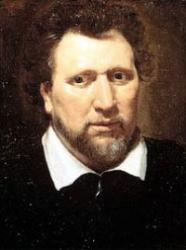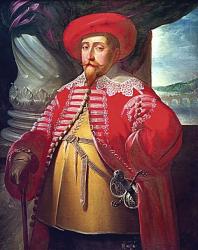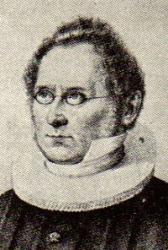Planning worship?
Check out our sister site, ZeteoSearch.org,
for 20+ additional resources related to your search.
- |
User Links
Person Results
Arthur T. Russell
1806 - 1874 Meter: 8.8.7.8.8.7 Author of "The Lord Ascendeth Up on High" in Rejoice in the Lord Arthur Tozer Russell was born at Northampton, March 20, 1806. He entered S. John's College, Cambridge, in 1824, took the Hulsean Prize in 1825, and was afterwards elected to a scholarship. He was ordained Deacon in 1829, Priest in 1830, and the same year was appointed Vicar of Caxton. In 1852, he was preferred to the vicarage of Whaddon. In 1863, he removed to S. Thomas', Toxteth Park, near Liverpool, and in 1867, to Holy Trinity, Wellington, Salop. He is the editor and author of numerous publications, among them several volumes of hymns.
--Annotations of the Hymnal, Charles Hutchins, 1872.
=================================
Russell, Arthur Tozer , M.A. He was the son of the Rev. Thomas Clout, who later changed his surname for Russell (Gentlemen’s Magazine, 1848), an Independent or Congregational minister who won for himself a good reputation by editing the works of Tyndale, Frith, Barnes, and Dr. John Owen, &c. He was born at Northampton, March 20, 1806; educated at St. Saviour's School, Southwark, and at the Merchant Taylors' School, London. In 1822-24 he was at Manchester College, York. In 1825 he entered St. John's College, Cambridge, as a sizar, and in his freshman year gained the Hulsean Prize, its subject being, "In what respects the Law is a Schoolmaster to bring men to Christ." In 1829 he was ordained by the Bishop of Lincoln (Kaye), and licensed to the Curacy of Great Gransden, Hunts, and in 1830 was preferred to the Vicarage of Caxton, which he held till 1852. During his ministry here he published the following works: The Claims of the Church of England upon the Affections of the People (1832); Sermons for Fasts and Festivals; A Critique upon Keble's Sermon on Tradition, in opposition. About 1840 appeared his Apology of the Church of England and an Epistle to Seignor Sapio concerning the Council of Trent, translated from the original Latin of Bishop Jewell. About the same time appeared Hymn Tunes, Original and Selected from Ravenscroft and other old Musicians, In 1841 was published A Manual of Daily Prayer. In 1844 Memorials of the Works and Life of Dr. Thomas Fuller….
His first appearance as a hymnwriter was in the 3rd edition of the hymn-book published by his father (1st ed. 1813), and known amongst Congregationalists as Russet's Appendix. In 1847 followed The Christian Life. In 1851 Psalms and Hymns, partly original, partly selected, for the use of the Church of England. … In 1867 he removed to Wrockwardine Wood, Shropshire, where he remained until 1874, when he was presented to the Rectory of Southwick, near Brighton. Here he died after a long and distressing illness, on the 18th of November, 1874. In his earlier years he was an extreme High Churchman, but by the study of St. Augustine his views were changed and he became, and continued to the end, a moderate Calvinist. His original hymns are gracious and tender, thoughtful and devout. His translations on the whole are vigorous and strong, but somewhat ultra-faithful to the original metres, &c. He left behind him a History of the Bishops of England and Wales in manuscript sufficient to form three or four goodly octavos, and numerous MS. Notes on the Text of the Greek Testament; and also a large number of original chants and hymntunes in manuscripts. [Rev. A. B. Grossart, DD. LLD.]
Of Russell's hymns a large number are included i Kennedy, 1863, and several also are in a few of the lesser known collections….Of his original hymns, about 140 in all, including those in Dr. Maurice's Choral Hymn Book, 1861, the following are found in a few collections:—
1. Christ is risen! O'er His foes He reigneth. Easter.
2. Give praise to God our King. Praise.
3. Great is the Lord; 0 let us raise. Ps. xlviii.
4. Hail, 0 hail, Our lowly King. Praise to Christ.
5. Hail, 0 Lord, our Consolation. Christ, the Consoler.
6. Holy Ghost, Who us instructest. Whitsuntide.
7. Holy Spirit given. Whitsuntide.
8. Hosanna, bless the Saviour's Name. Advent.
9. In the mount it shall be seen. Consolation.
10. In the tomb, behold He lies. Easter Eve. Sometimes "In the night of death, He lies."
11. Jesu, at Thy invitation. Holy Communion.
12. Jesu, Thou our pure [chief] delight. Praise for Salvation.
13. Jesu, when I think on Thee. In Afflictio.
14. Jesu, Who for my transgression. Good Friday.
15. Jesu, Lord most mighty. Lent .
16. Lift thine eyes far hence to heaven. Looking Onward. Sometimes "Lift thy longing eyes to heaven."
17. Lo, in 'mid heaven the angel flies. The Message of The Gospel.
18. Lord, be Thou our Strength in weakness. In Affliction.
19. Lord, my hope in Thee abideth. Hope in Jesus.
20. Lord, when our breath shall fail in death. Death anticipated.
21. Lord, Who hast formed me. Self-Consecration.
22. My God, to Thee I fly. In Affliction. Sometimes "Great God, to Thee we fly."
23. Night's shadows falling. Evening.
24. Now be thanks and praise ascending . Praise.
25. Now to Christ, our Life and Light. Evening.
26. 0 glorious, 0 triumphal day. Easter.
27. O God of life, Whose power benign. Trinity. In the Dalston Hymns for Public Worship, &c, 1848.
28. 0 Head and Lord of all creation. Passiontide.
29. 0 Jesu, blest is he. Consolation.
30. O Jesu! we adore Thee. Good Friday.
31. O Saviour, on the heavenly throne. The Divine Guide and Protector.
32. O Thou Who over all dost reign. Church Defence.
33. Praise and blessing, Lord, be given. Praise to Jesus.
34. Praise the Lord: praise our King. Advent.
35. The Lord unto my Lord thus said. Ps. cx.
36. The Morning [promised] Star appeareth. Christmas.
37. The night of darkness fast declineth. Missions.
38. The way to heaven Thou art, O Lord. Jesus the Way, Truth, and Life. Sometimes "Thou art the Way: Heaven's gate, O Lord."
39. Thou Who hast to heaven ascended. Ascension.
40. To Him Who for our sins was slain. Praise to Jesus, the Saviour. Written Friday, Jan. 24, 1851.
41. We praise, we bless Thee. Holy Trinity.
42. What, my spirit, should oppress thee. In Affliction.
43. What though through desert paths Thou leadest? Security and Consolation in Christ.
44. Whom shall I, my [we our] refuge making. Lent. Sometimes "Whom shall we our Refuge making."
45. Whosoe'er in Me believeth. The Resurrection.
46. Why, O why cast down, my spirit? In Affliction.
47. With awe Thy praise we sinners sing. Lent. Sometimes "With trembling awe Thy praise we sing."
48. With cheerful hope, my soul, arise. Security in God.
49. Ye hosts that His commands attend. Universal Praise of Jesus.
50. Your adoration, O earth and heaven, unite. Universal Praise to Christ.
Unless otherwise stated, all the above appeared in Russell's Psalms & Hymns, 1851. The total number of original hymns contributed by him to Maurice's Choral Hymn Book was 21.
--Exerpts from John Julian, Dictionary of Hymnology (1907)
Arthur T. Russell
Margarete Anna Adelheid Münsterberg
1889 - 1989 Meter: 8.8.7.8.8.7 Translator of "Go Forth, My Heart, And Seek Delight"
Margarete Anna Adelheid Münsterberg
Heinrich Puchta
1808 - 1858 Person Name: Heinrich Puchta, 1808-58 Meter: 8.8.7.8.8.7 Author of "Jesus Comes Today with Healing" in Lutheran Service Book Puchta, Christian Rudolph Heinrich, son of W. H. Puchta, then residing as Justizrath at Kadolzburg, near Nürnberg, was born at Kadolzburg, Aug. 19, 1808. He matriculated at the University of Erlangen, in 1826, and completed his theological course at Berlin. In 1832 he was appointed Stadtvicar (general assistant preacher) at Munich, where he became acquainted with many men of light and leading; and in 1837 became repetent in theology at Erlangen. In 1839 he was appointed professor of Philosophy and Religion in the newly organised Lyceum at Speyer (Spires), but his nervous system broke down in 1841, and he had to be confined in the lunatic asylum of Winnenthal, Württemberg. After a year he was able to take charge of the parish of Eyb, near Ansbach, and then became, in 1852, second pastor, and in 1856, first pastor of St. James's Church, in Augsburg. He died at Augsburg, Sept. 12, 1858 (Koch, vii. 277; Allgemeine Deutsche Biographie xxvi. 687, &c).
Puchta had a genuine poetic faculty, and a mastery of style. His early poems were secular; his later were mostly hymns. His hymns were mainly meant for private use, and appeared principally in his Morgen-und Abend Andachten am Christlichen Hausaltar in Gesängen, Erlangen, 1843 (2nd ed. 1857, 3rd 1868). Besides these, 38—including 11 translations from the Latin—-were given in Knapp's Christoterp, 1837-1852. A few others, with a selection of his poems, edited by Knapp, appeared in his posthumousGedichte, Stuttgart, 1860. Knapp in his Evangelischer Lieder, 1850, included 30 hymns by Puchta, and in his edition of 1865 no less than 42. Puchta was also one of the editors of the Bavarian Gesang-Buch, 1854.
Those of his hymns which have passed into English (all from his Hausaltar, 1843) are:—
i. Ein neues Jahr ist angefangen. New Year. In 1843, p. 173, as above, in 6 stanzas entitled, "New Year's Morning." In Knapp's Evangelischer Lieder-Schatz, 1850, No. 2104. Translated as, "Another year we now have enter'd," by Miss Burlingham, in the British Herald, January, 1866, p. 200, and Reid's Praise Book, 1872.
ii. Herr des Himmels, Gott der Gnade. Sunday. In 1843, p. 3, as above, in 6 st., entitled “Sunday Morning." In Knapp, 1850, No. 1171. Transalted as, "God of grace and Lord of heaven," in L. Rehfuess's Church at Sea, 1868, p. 88.
iii. Herr ein ganzer Leidenstag. For the Sick. In 1843, p. 227, as above, in 6 st., entitled, "In sickness. First evening." In Knapp, 1850, No. 2689. Translated as, ”Lord, a whole long day of pain," by Miss Winkworth, 1858, p. 81. Her st. i.-iv. are No. 263 in Bishop Ryle's Collection 1860. [Rev. James Mearns. M.A.]
--John Julian, Dictionary of Hymnology (1907)
Heinrich Puchta
Ben Jonson

1573 - 1637 Person Name: B. Jonson, c. 1572-1637 Meter: 8.8.7.8.8.7 Author of "I Sing the Birth" in Evangelical Lutheran Hymnary Jonson, Benjamin, commonly known as Ben Jonson, the son of a clergyman, was born at Westminster in 1573, and educated at Westminster School, and St. John's, Cambridge. He died in London, Aug. 6, 1637. His history and dramatic abilities are well known to all students of English literature. He is known in association with hymnody mainly through his carol, "I sing the birth—was born tonight," which is still in use. It is given in his Underwoods in the 2nd vol. (folio) of his Works, 1640, and entitled "A Hymn on the Nativity of my Saviour." Two additional hymns therein, "The sinner's sacrifice" and "A Hymn to God the Father," have much merit, but are unsuited for congregational use. His Works have been edited by Gifford, and more recently by Lieut. Col. Francis Cunningham.
--John Julian, Dictionary of Hymnology, Appendix, Part II (1907)
=================
Jonson, Ben, p. 606, i. His “Hymn to God the Father," beginning “Hear me, O God. A broken heart," is in Turing's Collection, 1882, in an abridged form.
--John Julian, Dictionary of Hymnology, Appendix, Part II (1907)
Ben Jonson
Michael D. Schultz
Person Name: Michael D. Schultz, b. 1963 Meter: 8.8.7.8.8.7 Author of "Praise to You, Eternal Father" in Christian Worship
Michael D. Schultz
Johann Gottfried Schicht

1753 - 1823 Person Name: J.G. Schicht Meter: 8.8.7.8.8.7 Composer of "ASCENDIT DEUS" in Rejoice in the Lord Johann Gottfried Schicht
Born: September 29, 1753 - Reichenau, Zittau, Germany
Died: February 16, 1823 - Leipzig, Germany
Johann Gottfried Schicht
Gustav II Adolf

1594 - 1632 Person Name: Gustavus Adolphus, 1594-1632 Meter: 8.8.7.8.8.7 Author of "Be not Dismayed" in Hymnal and Order of Service
Gustav II Adolf
C. J. Boye

1791 - 1853 Person Name: Casper Johannes Boye Meter: 8.8.7.8.8.7 Author of "Day Is Breaking, Night Is Ended" in Hymnal for Church and Home Caspar Johannes Boye was born in Kongsberg, Norway in 1791. He studied both law and theology at the University of Copenhagen, became a teacher and later served as rector in Søllerød, Helsingørand and Copenhagen. He died in 1853.
See also in:
Wikipedia
C. J. Boye
Jacobus Fabricius
1593 - 1654 Person Name: Jacob Fabricius,1593-1654 Meter: 8.8.7.8.8.7 Author of "Do Not Despair, O Little Flock" in Lutheran Worship Fabricius, Jacob, a chaplain in the army of Gustavus Adolphus, was born in 1593, and died in 1654. There is some doubt as to the authorship of the hymn here credited to him. Some hymnologists have attributed it to Johann Michael Altenburg (1584-1640), a preacher, teacher, and musician of Erfurt, and others attribute it to Gustavus Adolphus. "Fear not, O little flock, the foe." 445
Hymn Writers of the Church, 1911 by Charles Nutter
=================
Born: July 19, 1593 - Köslin (Pommern)
Died: August 11, 1654 - Stettin
The Lutheran theologian, Jakob Fabricius, was a son of a shoemaker.
Since 1620 Fabricius was the preacher of the Duke Bogislaw XIV von Pommern. In 1626 he attained a doctorate in theology in Greifswald. In January 1631 the Duke Gustav Adolf appointed Fabricius as his preacher. As a preacher and a priest Fabricius accompanied the King Gustav Adolf on his travels in Germany. After the death of the King in November 16, 1632, in the battle with Lützen, Fabricius stepped again into the service of the Duke of Pommern and became in 1634 Superintendent for Eastern Pomerania.
Disputed is the question whether Fabricius or Michael Altenburg were the poet of the song "Verzage nicht, du Häuflein klein!".
--www.bach-cantatas.com/
Jacobus Fabricius
Alexander Ramsay Thompson
1822 - 1895 Person Name: Alexander R. Thompson Meter: 8.8.7.8.8.7 Translator of "Zion, to thy Saviour singing" in The Hymnal Thompson, Alexander Ramsay, D.D., a minister of the American Reformed Dutch Church, was born at New York, Oct. 22, 1822, and graduated at the New York University, 1842, and the Princeton Seminary, 1845. He was Reformed Dutch Pastor at various places, including East Brooklyn, St. Paul's (R. P. D.), New York City, North Reformed Church, Brooklyn (1874), and others. Dr. Thompson was joint editor of the Reformed Dutch Hymns of the Church, N. Y., 1869, and the Hymns of Prayer and Praise, 1871. He has contributed original hymns and translations from the Latin to these collections, to Schaff’s Christ in Song, 1869, and to the Sunday School Times, Philadelphia, 1883, &c. In addition two original hymns:—
1. 0 Thou Whose filmed and fading eye. Good Friday.
2. Wayfarers in the wilderness. Life a Pilgrimage.
are in the Hymns of the Church, 1869, with the signature "A. R. T." [Rev F. M. Bird, M.A.]
-- Excerpts from John Julian, Dictionary of Hymnology (1907)
Alexander Ramsay Thompson


 My Starred Hymns
My Starred Hymns


